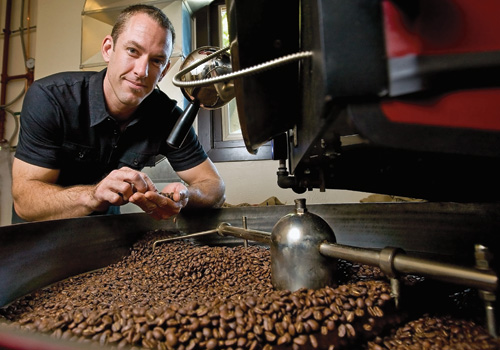 Noble Coffee Roasting in Ashland has built its success on sustainable ethics and a reverence for quality.
Noble Coffee Roasting in Ashland has built its success on sustainable ethics and a reverence for quality.
 |
PHOTO BY JAMIE LUSCH |
Just leaning across the wood-topped stand-up bar to talk to a customer, Jared Rennie is in motion. He’s not distracted. Thirty-four-year-old Rennie is the founder and co-owner of Noble Coffee Roasting, a wholesale and retail organic coffee business with its global headquarters in a 3,000-square-foot airy space in the up-and-coming Railroad District in Ashland. Rennie is focused on the conversation, talking with his hands.
He speaks about coffee the way he uses the shop’s La Marzocco espresso machine, with a restless energy and movements as purposeful and efficient as a tennis player’s.
“There’s been a very strong positive reaction to what we do,” says Rennie, nodding to the queue of customers — both locals and tourists — who await the richly flavored precision-brewed coffee presented with the panache of a gourmet dessert for which Noble is becoming famous. Every varietal of coffee they serve is roasted and prepared to bring out individual characteristics. Whether citrusy and wine-like, or full-bodied and caramely, each batch is different but absolutely delicious.
| Noble Coffee Roasting |
| Founder: Jared Rennie |
| Founded: 2006 |
| Pounds of coffee roasted per week: up to 1,500 |
| Customers: 500 per day, 62 per hour |
| Annual gross sales: $1 million |
| Employees: 17 |
| Price of Probat roasting equipment: $50,000 |
Though critics doubted that Ashland could support another coffee business (with its 20,000-some inhabitants, the city already has two Starbucks and about 10 independent coffee houses), Noble has seen more than triple-digit growth in both the wholesale and the retail business since the café opened in May 2009.
Noble uses only fairly traded and sustainably grown coffee. Drinks range from $2 to $4 for siphon coffee made to order, and are made with only organic coffee and milk, and to standards so demanding that drinks are served just one way, with no personal preferences. The barista will throw away a bad shot rather than serve it.
The main tenets of Rennie’s values-driven business philosophy: uncompromising product and slow growth. Noble has accounts throughout Oregon and California’s Bay Area, and Rennie says there is more demand for his product — and the extensive training given to any business serving Noble coffee — than he can accommodate. Rennie has had calls from Alabama and southeastern Washington. He has been turning down customers.
“We pay a lot of attention to our accounts. We also have a high level of expectation,” Rennie explains. “We’ve pulled our coffee from some accounts because they butcher it. We want Noble Coffee to mean something … Doing great coffee is really hard. It’s really easy to take great coffee and mess it up.”
Rennie is no stranger to doing things the hard way. Growing up working class, he and his family moved often because of his stepfather’s failed business ventures. Rennie remembers how he and his brother would resell golf balls collected at the driving range to give the money to their mom to buy food.
When he was 12 the family settled in Medford. Rennie earned his B.A. at Southern Oregon University in 1999 with a double major in Spanish and International Studies. Working his way through college, he learned the coffee roasting business at a roastery in Jacksonville. Though he was passionate about coffee (he convinced his wife, Carolyn, that they should buy a home espresso machine for $1,000), he earned a Master’s in teaching and taught high school Spanish for eight years.
But Rennie missed coffee. He had been telling his students (two of whom now work for Noble) to follow their dreams. “After years trying to convince myself not to do it, I finally said to my wife, let’s give it a go,” he says. “I told her we might fail. We might go bankrupt and lose our house. But we decided to do it anyway. On big decisions you have to follow your heart.”
Though that sounds woo-woo, Rennie didn’t just open the doors and hope people would come buy a luxury product in the middle of a recession. He and his partners began by roasting in Rennie’s garage and selling beans and service locally for two years, making a name for the brand. While preparing the retail space, they opened the back door in the alley three mornings a week and gave away espresso drinks, generating buzz while honing technique with the new machine. By the time Noble opened for business, people were lining up to get in.
“It’s the responsibility of business owners to improve the world in some way,” says Rennie. He knows many of the coffee growers personally and gladly pays higher prices for quality product. “Even in a small way. Even if it’s just with a cup of coffee.”


